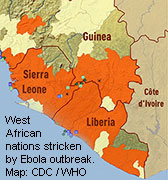
WEDNESDAY, Oct. 29, 2014 (HealthDay News) — The Ebola outbreak in Liberia — one of three West African nations ravaged by the disease — may be slowing, World Health Organization officials said Wednesday.
Dr. Bruce Aylward, WHO’s assistant director general, said there’s been a decline in the number of burials in Liberia and no increase in laboratory-confirmed cases. He said he was cautiously optimistic that the global push to tame the epidemic may be making some progress, The New York Times reported.
“Do we feel confident that the response is now getting an upper hand on the virus?” he said in a telebriefing with reporters from the organization’s Geneva, Switzerland, headquarters. “Yes, we are seeing slowing rate of new cases, very definitely” in Liberia.
However, Aylward cautioned against assuming that health care workers had turned the tide against Ebola in Liberia, where more than half of West Africa’s infections have occurred. Ebola cases could surge again, as has happened since the epidemic began last spring.
Benoit Carpentier, a spokesman for the International Federation of the Red Cross, also urged restraint, noting that Ebola outbreaks tend to come in waves. And Red Cross figures show deaths are still increasing outside Monrovia, the capital of Liberia, the Associated Press reported.
Aylward said WHO’s latest statistics show slightly more than 13,700 infections and at least 5,000 deaths in West Africa. Besides Liberia, the other hard-hit countries are Guinea and Sierra Leone.
Also Wednesday, U.S. Defense Secretary Chuck Hagel approved a recommendation by military leaders that all American troops sent to West Africa to help in the fight against Ebola be kept in supervised isolation for 21 days upon their return, the AP reported.
The decision exceeds Obama administration precautions for civilians, although President Barack Obama has noted that the situation of troops is different from that of civilians because troops aren’t in West Africa by choice, the news service said.
Hagel called the 21-day isolation policy a “safety valve.” Top military leaders cited several factors that argue in favor of the extended confinement, including the concerns of military families and the communities where the troops are based, according to the AP.
On Monday, U.S. health officials issued new guidelines for monitoring people at risk for Ebola exposure — a move designed, in part, to combat some of the fear surrounding Ebola infection.
The new guidelines apply to health care workers, whether they’re returning home from the West African outbreak zone or caring for patients in the United States.
The guidelines establish four levels of risk — “high” risk, “some” risk, “low” risk and “no” risk — and recommend the sorts of restrictions and health monitoring that should accompany each category, Dr. Tom Frieden, director of the U.S. Centers for Disease Control and Prevention, said at an afternoon news briefing.
Under the guidelines, people at high risk of Ebola exposure would be confined to their homes in voluntary isolation, while people carrying some risk would have their health and movements monitored by local officials.
Those at high risk or with some risk would have daily in-person check-ups from state and local health departments for 21 days — the outside limit for infection from Ebola.
Hospital employees in the United States caring for Ebola patients here would fall within the “low-risk” category for exposure, as would travelers from the affected West African countries who have not been around any people sick with Ebola.
The CDC issued the new guidelines after the governors of New York and New Jersey implemented controversial quarantine measures last week for medical workers returning from West Africa, then backed off after sharp criticism from much of the U.S. medical community.
Critics said the quarantines would discourage doctors, nurses and other health professionals from traveling to West Africa to combat the epidemic.
More information
For more on Ebola, visit the U.S. Centers for Disease Control and Prevention.
Copyright © 2026 HealthDay. All rights reserved.

